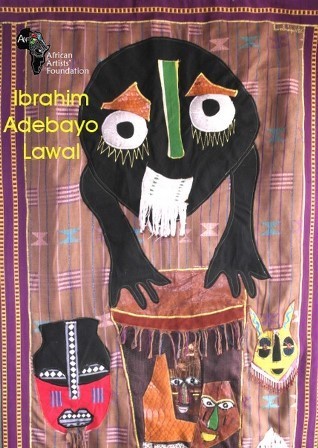For Neo Nubians,
IBRAHIM ADEBAYO LAWAL
Ibrahim Adebayo Lawal is a new-generation African, a poster boy for the driving spirit of success that overcomes adversity and deprivation. Born in 1979, Lawal is from Ilorin, Kwara State. He obtained a diploma in Cultural Administration from Nassarawa State University, Lafia, Nassarawa State in 2011.
A calm and hardworking young man, Lawal has always wanted to make people look good. This desire once steeped in mischief manifested in primary school where he would taunt and tease his poorly dressed schoolmates. With time he developed an interest in local fabrics, which led him to serve as an apprentice under Alhaji Drammeh, a Senegalese residing in Nigeria, shortly after completing his primary school education in 1992. After serving Drammeh for six years, he moved to JimiKing, where he gained the necessary knowledge that has kept him relevant in the fashion industry both in Nigeria and in the international scene. Other industry icons he has worked with include Princess Abba Folawiyo of Labanella, Franca Fashion; he went back to JimiKing where he learned how to intricately weave wall hangings, customized bags, tablecloths, embroidery and local fabrics. Speaking at an interview, Lawal says “I have always taken an interest in local fabrics.” Speaking further, he says “Nigerians have not fully appreciated the uses to which indigenous fabrics can be used. Adire, Aso-Oke, even the ones in the Northern and Eastern parts of the country are [great] for making local and international apparels.”

In 2013 he held an exhibition at the African Artists’ Foundation titled Memory and Metaphor. In his works, he captured traditional symbols of power, deity and imagination, harnessing the techniques of embroidery and quilting to create tapestries which held cultural and historical significance, and that explored traditionalism in contemporary Nigerian culture. Having researched into Yoruba folklore, Adebayo painstakingly translates the figures of festival masquerades onto locally woven cloth, also known as Aso-Oke. These works create a visual timeline of folklore and customs while arousing questions on the locations of our indigenous identities. He describes his work as Agbara Asa, meaning the ‘power of culture’.
Adebayo has participated and played major roles in many exhibitions and fashion shows, some of which include the Shobande Talent Hunt Show 2007, Ikoko Meta movie premiere, Whitehouse Ikeja, Lagos and the wave-making Agbara Asa Fashion Show 2007, which was premiered at the Performing Musicians Association of Nigeria (PMAN), National Secretariat in Lagos Nigeria. He was at the 2008 edition of the Centre for Black African Arts and Civilisation, (CBAAC), Black History Month, the National Workshop for Rejuvenation of National Integration and Sustainable Development, Lekki Peninsula Resort, Ajah Lagos, the World Culture Day celebration held at the International Conference Centre Abuja and the Yoruba World Film Festival held at the National Theater, Iganmu, Lagos. He was chairman sub-committee for Olokun Festival beach soccer and fashion segments, 2009.
Lawal Adebayo Ibrahim is optimistic about the future and encourages young people to be positive about life. Speaking on the importance of being positive, he says “I have seen a lot of people with potential drift into failure because of a lack of purpose and determination. Young people are getting into trouble, not necessarily because they do not have anything to do, but because most of them are ignorant and very poor even in attitude.” Among his benefactors, he is quick to acknowledge the help of Professor Tunde Babawale, Director of the Center for Black African Art and Culture, and the entire CBAAC staff. “I don’t even know the man,” he said, “but I am very sure he is God sent. He saw me once and took interest in me.”
As he continues to build his brand, the Ibrahimovic Arts and Fashion Empire, Adebayo wants blue chip companies to encourage staff to dedicate a few days in the week to wearing indigenous fabrics. Speaking on this, he says “We are in a tropical country… We must appreciate indigenous fashion [and fabric].”
Neo-Nubians are treading the forefront of innovation; they are risk-takers, tech-savvy, well informed and able to rise above oppressive conditions to venture out with their ideas. For them, the confines they’ve long grown up in have become all too stifling, and there’s something in them that demands expression. It’s all about finding a voice, their voice, giving their answers to the questions they have found out there, across various life areas- art, technology, business, humanitarianism etc. For Neo Nubians, the night is over; no veil, no shroud- they have found their morning, and they have woken to it…
… Neo Nubians, the world is yours, rule it.
